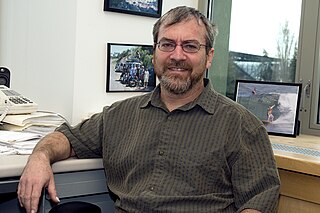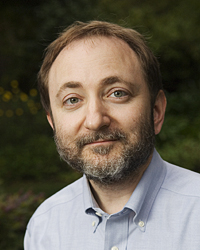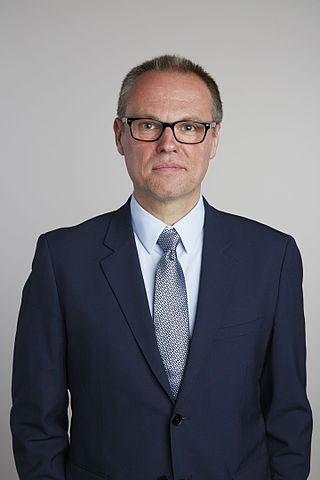
Mario Ramberg Capecchi is an Italian-born molecular geneticist and a co-awardee of the 2007 Nobel Prize in Physiology or Medicine for discovering a method to create mice in which a specific gene is turned off, known as knockout mice. He shared the prize with Martin Evans and Oliver Smithies. He is currently Distinguished Professor of Human Genetics and Biology at the University of Utah School of Medicine.
The Canada Gairdner International Award is given annually by the Gairdner Foundation at a special dinner to five individuals for outstanding discoveries or contributions to medical science. Receipt of the Gairdner is traditionally considered a precursor to winning the Nobel Prize in Medicine; as of 2020, 98 Nobel Prizes have been awarded to prior Gairdner recipients.

Robert Samuel Langer Jr. FREng is an American biotechnologist, businessman, chemical engineer, chemist, and inventor. He is one of the nine Institute Professors at the Massachusetts Institute of Technology.

Professor Michael H. Gleb is an American biochemist and chemist specializing in enzymes and particularly those of medical significance. He is the Boris and Barbara L. Weinstein Endowed Chair in Chemistry at the University of Washington in Seattle. He also teaches Honors Organic Chemistry, Chemical Biology and Enzymology.
The Lewis S. Rosenstiel Award for Distinguished Work in Basic Medical Research is awarded by Brandeis University. It was established in 1971 "as an expression of the conviction that educational institutions have an important role to play in the encouragement and development of basic science as it applies to medicine".

Craig Cameron Mello is an American biologist and professor of molecular medicine at the University of Massachusetts Medical School in Worcester, Massachusetts. He was awarded the 2006 Nobel Prize for Physiology or Medicine, along with Andrew Z. Fire, for the discovery of RNA interference. This research was conducted at the Carnegie Institution of Washington and published in 1998. Mello has been a Howard Hughes Medical Institute investigator since 2000.

Andrew Zachary Fire is an American biologist and professor of pathology and of genetics at the Stanford University School of Medicine. He was awarded the 2006 Nobel Prize in Physiology or Medicine, along with Craig C. Mello, for the discovery of RNA interference (RNAi). This research was conducted at the Carnegie Institution of Washington and published in 1998.

Gero Andreas Miesenböckef> is an Austrian scientist. He is currently Waynflete Professor of Physiology and Director of the Centre for Neural Circuits and Behaviour (CNCB) at the University of Oxford and a fellow of Magdalen College, Oxford.
The David Syme Research Prize is an annual award administered by the University of Melbourne for the best original research work in biology, physics, chemistry or geology, produced in Australia during the preceding two years, particular preference is given to original research to enhance industrial and/or commercial development.

Victor R. Ambros is an American developmental biologist and Nobel Laureate who discovered the first known microRNA (miRNA). He is a professor at the University of Massachusetts Medical School. He completed both his undergraduate and doctoral studies at the Massachusetts Institute of Technology. Ambros received the Nobel Prize in Physiology or Medicine in 2024 for his research on microRNA.
The Wiley Prize in Biomedical Sciences is intended to recognize breakthrough research in pure or applied life science research that is distinguished by its excellence, originality and impact on our understanding of biological systems and processes. The award may recognize a specific contribution or series of contributions that demonstrate the nominee's significant leadership in the development of research concepts or their clinical application. Particular emphasis will be placed on research that champions novel approaches and challenges accepted thinking in the biomedical sciences.

Alan Davison FRS was a British inorganic chemist known for his work on transition metals, and a professor at Massachusetts Institute of Technology.

James Patrick Allison is an American immunologist and Nobel laureate who holds the position of professor and chair of immunology and executive director of immunotherapy platform at the MD Anderson Cancer Center in Houston, Texas. Allison is Regental Professor and Founding-Director of James P. Allison Institute at the MD Anderson Cancer Center.

Sir Stephen Patrick O'Rahilly is an Irish-British physician and scientist known for his research into the molecular pathogenesis of human obesity, insulin resistance and related metabolic and endocrine disorders.
The Massry Prize was established in 1996, and is administered by the Meira and Shaul G. Massry Foundation. The Prize, of $40,000 and the Massry Lectureship, is bestowed upon scientists who have made substantial recent contributions in the biomedical sciences. Shaul G. Massry, M.D., who established the Massry Foundation, is Professor Emeritus of Medicine and Physiology and Biophysics at the Keck School of Medicine, University of Southern California. He served as Chief of its Division of Nephrology from 1974 to 2000. In 2009 the KECK School of Medicine was asked to administer the Prize, and has done so since that time. Out of 25 prizes bestowed until 2021, fourteen were awarded to future Nobel Prize winners. No Massry Prize was awarded in 2020, 2022 and 2023.

Feng Zhang is a Chinese–American biochemist. Zhang currently holds the James and Patricia Poitras Professorship in Neuroscience at the McGovern Institute for Brain Research and in the departments of Brain and Cognitive Sciences and Biological Engineering at the Massachusetts Institute of Technology. He also has appointments with the Broad Institute of MIT and Harvard. He is most well known for his central role in the development of optogenetics and CRISPR technologies.

Angela Hartley Brodie was a British biochemist who pioneered development of steroidal aromatase inhibitors in cancer research. Born in Lancashire, Brodie studied chemical pathology to a doctoral level in Sheffield and was awarded a fellowship sponsored by National Institutes of Health. After 17 years of working in Shrewsbury, Massachusetts on oral contraceptives with Harry Brodie, whom she married, she switched focus to the effects of the oestrogen-producing enzyme, aromatase, on breast cancer.
Houra Merrikh is an Iranian-American microbiologist. She is a full professor at Vanderbilt University in the Department of Biochemistry. Her field of work is antibiotic resistance and bacterial evolvability.

Michel Sadelain is a genetic engineer and cell therapist at Memorial Sloan Kettering Cancer Center, New York, New York, where he holds the Steve and Barbara Friedman Chair. He is the founding director of the Center for Cell Engineering and the head of the Gene Transfer and Gene Expression Laboratory. He is a member of the department of medicine at Memorial Hospital and of the immunology program at the Sloan Kettering Institute. He is best known for his major contributions to T cell engineering and chimeric antigen receptor (CAR) therapy, an immunotherapy based on the genetic engineering of a patient's own T cells to treat cancer. Dr. Sadelain is an elected member of the National Academy of Medicine of France and the American Academy of Arts & Sciences.












